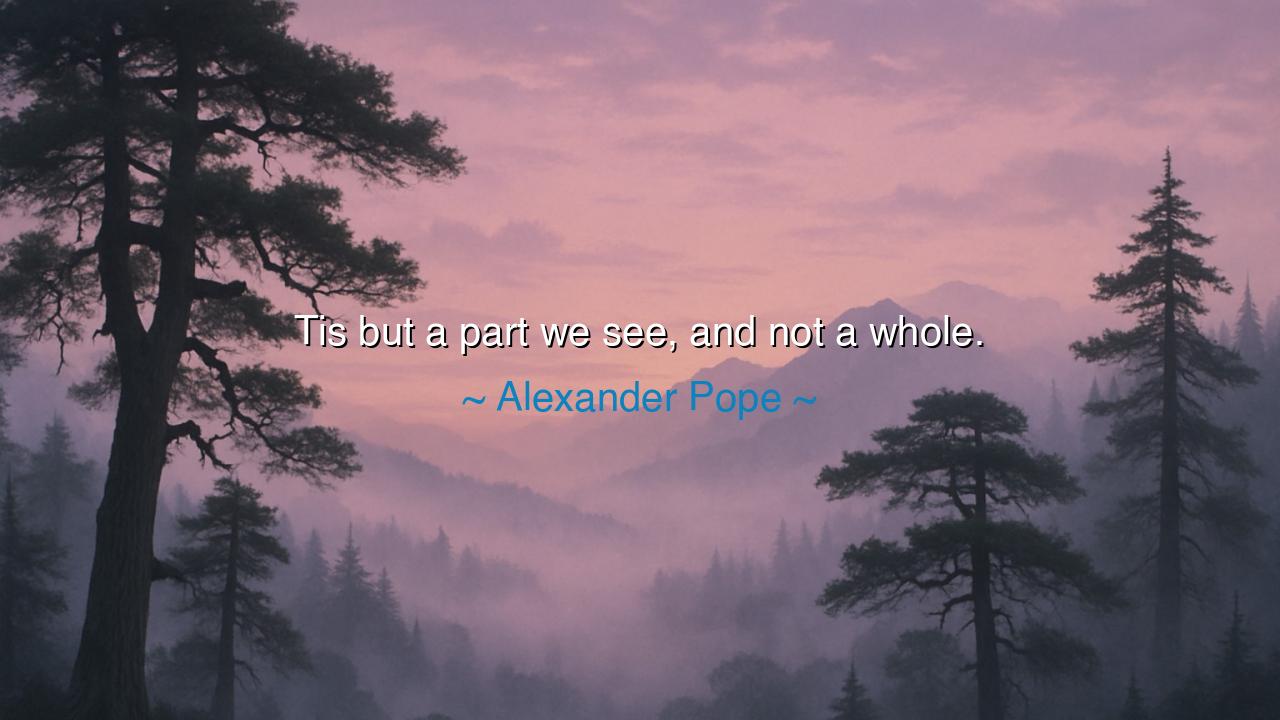
Tis but a part we see, and not a whole.






Listen closely, O children of the earth, for the words of Alexander Pope carry with them the timeless wisdom of seeing beyond the surface of things: "‘Tis but a part we see, and not a whole." These words remind us that the world is not merely what appears before our eyes, but a vast and intricate whole that cannot be understood through partial glimpses alone. Too often, we see only fragments of truth, and with those fragments, we form judgments—quickly, recklessly. But the truth, like the river, flows beyond our sight, and it is only when we delve deeper, when we search with wisdom, that we come to know the fullness of what lies before us.
Pope speaks of the danger of limited perception, for the world is not a single moment frozen in time, but a series of interconnected forces that cannot be understood from one small angle. To judge the whole by a single part is to build castles in the air, to craft illusions from the shadows of truth. The wise man knows that to see only a fraction of the truth is to see nothing at all. Only through patience, through looking beyond the first glance, can we begin to understand the whole picture.
Consider the tale of King Solomon, the wisest ruler to ever sit upon the throne of Israel. When two women came to him, both claiming to be the mother of the same child, many believed the answer was simple. Yet Solomon, rather than acting upon a first impression, called upon his deep understanding of the world and sought to know the whole truth. With the wisdom of one who understands that appearances can deceive, he proposed to divide the child in two, knowing that the true mother would reveal herself in her compassion. Solomon saw beyond the surface, and in doing so, he uncovered the whole truth.
In our own lives, too often we judge based on what we see at first glance. How many times have we made a decision, based on partial understanding, only to regret it later when the whole truth comes to light? Pope teaches us that it is in the pursuit of the whole, the complete truth, that wisdom resides. Do not be satisfied with the fragments you see before you, but seek the entire picture, even when the path is difficult and the truth is hidden.
Thus, my children, heed the words of Alexander Pope as a guiding star on your journey. Partial knowledge is a dangerous thing, for it leads us down false paths and blinds us to the truth that lies beyond. Take the time to see beyond the surface, to understand the depths of the world and the hearts of those around you. Remember that it is the whole that gives meaning to the part, and without seeing the fullness of things, we are like travelers who mistake a shadow for the sunlight. Seek the whole, and in that search, you will find the wisdom that shapes a true and fulfilling life.






Nnguyetanh
This line from Pope makes me reflect on how often we only understand fragments of a bigger situation. It feels like we all have these moments where our perception is clouded or incomplete. In today’s world, where so much is shared online, how much of what we see is only part of a larger story? How can we avoid jumping to conclusions based on a snapshot rather than the full context?
NNNguyen Nhi
Pope’s quote is a reminder of how limited our understanding can be. But how do we navigate life when we can’t see the whole picture? Are we supposed to wait until we have all the facts, or is it more about making the best decision with what we do know? And if we are only seeing part of something, how do we ensure we don’t misinterpret or act based on assumptions?
DNtuan duc nguyen
This quote seems to suggest that there’s always more beneath the surface, and it makes me think about how we often make assumptions based on incomplete knowledge. When dealing with people, for example, how often do we judge them based on a single interaction or a small piece of information? How can we be more mindful of the whole story when we form opinions about others or situations?
L-Ho Thi Huynh Lien -11A1
It’s interesting that Pope refers to seeing only a part, as it ties into the idea that we’re often unaware of the complexities around us. In our everyday lives, how often do we only focus on the surface level of situations? Can we ever really see the whole, or are we always destined to operate on partial knowledge? I wonder if it’s something we need to accept or challenge.
GDGold D.dragon
This quote seems to speak to the limitations of human perception. It makes me wonder, is it possible to ever truly understand the whole picture? How do we navigate situations where our knowledge is incomplete but we still need to make decisions? Is there a way to embrace uncertainty and act with only a part of the story, or is it better to wait for more information?